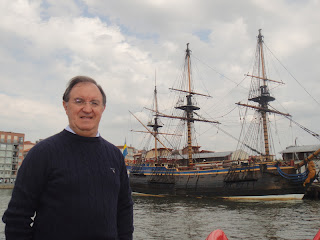European Maritime Day - Gotemborg 2012
It has been my second participation on the European Maritime Day, the first one, last year, in Gdansk, Poland, and this year in Gotemborg, Sweden.
I, myself, have already participate on the very first day, monday, oriented for the participation of the citizens and the Civil Society.
Early morning I arrived at Elxxxxxx where a lot of ships, boats, marine boats from Denmark and Sweden were open for people visiting and puting questions.
All the area was crouded of people and I have benn introduced to so many entities and public in general, as a EESC Member and really, people put questions about our Institution.
For this, I had the great contribution of some polish friends that were the organizers last year in Gdansk and they remembered me.
It is important to mention the activity, this first day, aside of the Conference, of some ONGs supporting the sustainable grouth and safety of the Planet, the Consummers , the Army and Red Cross International, Port Authorities, Shipyard Owners and Fisheries.
The opening of the Conference was made by the swedish Minister of Infrastructure, Catharina Svard and the Mayor of Gotemborg Gert-Ing Andersson before the keynote speach of Maria Darmanaki, Commissioner for Maritime Affairs and Fisheries.
Mr Koji Sekimizu, Secretary General of International Maritime Organization did a very important comunication and mentioned his visit to the place where this conference tooks place, twenty years ago, where the important shipyards of Gotemborg were a very important industrial reallity.
Nowadays, all that area is a residential and construction area, a sign of the changing times and economic environement.
Next step of the working day, was the official signature of the European Social Partners Agreement on the ILO Convention 188, between the EU authorities , the Trans
Ort Workers Federation and the Sea Fisheries Sector.

Most of this first day of the Conference was dedicated to the Plenary Sessions which concerned Marine and maritime innovation in Europe, Sustainable use of healthy seas, a very interesting presentation by a investigator from a spanish developmemt company leading with farmacos coming from the sea. Also, some interesting subjects in this Plenary Session like Renewable marine energy and infrastructures, Innovation solutions for sustainable transport in sea and the Regional strategies as a path to sustainability and economic grouth.
There were different parallel sessions, during the afternoon. I have chosen the one that covered the Maritime Surveillance and the use of more knowledge and technology as a way to cut costs.
Less costs and more efficiency in the maritime surveillance, something that is possible by the working together of 14 countries in the past two years. This cooperation has given to all of those eurpean countries a more efficient maritime surveillance of their seas, basec on cooperation across borders and across sectors with the project BlueMassMed.
On the second day of the Conference, oriented to the Stakeholder, the opening speach was from Mr Lowri Evans, Director General of DG Maritime Affairs and Fisheries of the EU.
During this second day we discussed the new opportunities for blue growth and innovation and the value of the regional and national maritimeclusters in the EU.
I have to mention that the Presdient of the Committee of the Regions had planned to make a comunication about this subject but, has she couldn' t be present, has delegate her speach to a Member of the CdR who, briefly took the floor amd adressed to the audience a nice comunication.
Improving synergies and cooperation for better governance, join activities, tools and projects, better iSe of available ressources and increasing visibility of the maritime part of the EUSBSR.
I have to mention the important participation of theCouncil of Baltic Sea States, Baltic Sea Parliamentary Conferenceand Baltic Sea Forum and HELCOM.
Commissioner Maria Darmanaki
One of the subjects hardly discussed was the EU fisheries reform.
The main points I have keep in my mind are:
The new common Fisheries Policy (CFP) must require EU countries to reduce exploitation rates to allow the long term recovery of stocks to levels that can sustain catches without risking further depletion.
The new CFP grant priority access to fishing to those fishermen who have the least impact on the environment and add the most value to local fishing communities.
Eu countries must be required to provide information on the size and impact of their fishing fleets in relation to the health of the stocks they fish.
The main points I have keep in my mind are:
The new common Fisheries Policy (CFP) must require EU countries to reduce exploitation rates to allow the long term recovery of stocks to levels that can sustain catches without risking further depletion.
The new CFP grant priority access to fishing to those fishermen who have the least impact on the environment and add the most value to local fishing communities.
Eu countries must be required to provide information on the size and impact of their fishing fleets in relation to the health of the stocks they fish.
EU countries must be required to reduce overall fishing capacity to a level that is aligned with a sustainable rate of fishing.










Sem comentários:
Enviar um comentário